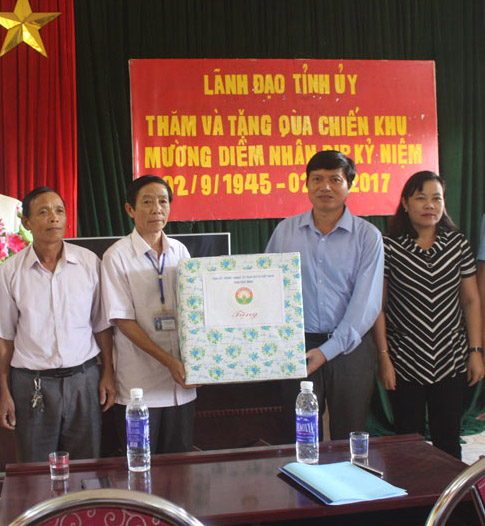
HBO – Vice Secretary of Hoa Binh province’s Party Committee and Chairman of the provincial People’s Council Tran Dang Ninh recently led a delegation to visit and present gifts to locals in Muong Diem and Giang Seo revolutionary bases in Da Bac district, on this occasion of the August Revolution (August 19) and National Day (September 2).

Vice Secretary of Hoa Binh
province’s Party Committee and Chairman of the provincial People’s Council Tran
Dang Ninh visits and presents gifts to people in Muong Diem revolutionary base
(Da Bac).
In early April 1945, following the
direction of the Party Committee of the northern region, the provincial Party
Committee decided to establish the Muong Diem revolutionary base. Thanks to
support from local people, the base’s revolutionary force became stronger and significantly
contributed to the victory of the uprising for administration in August 1945 in
Bo market, Rut spring, and
Vang
street of Hoa Binh province and Moc Chau of Son La
province. Muong Diem revolutionary base was recognised as a national
revolutionary historical relic site in 1996 by the Ministry of Culture and
Sports.
Promoting the revolutionary
tradition, the Party Organisation, authorities and people in Trung Thanh
commune have overcome difficulties and gained significant achievements over the
past years.
Tran Dang Ninh recalled the history
of the two bases, while applauding efforts of the commune’s Party Organisation,
authorities and people to boost socio-economic development.
He expressed his hope that Da Bac
district and Trung Thanh commune to focus resources on fostering socio-economic
development, restore the bases’ stele houses and traditional houses to educate
young generations on the nation’s revolutionary tradition.
The Standing Board of the Hoa Binh provincial Party Committee has agreed in principle on a proposal by the Standing Board of the Party Committee of Hoa Binh city to gather feedback on the city’s 1:2000 zoning plan, which forms part of its broader urban development strategy.
Hoa Binh province has made notable progress in public administration reform and digital government development, with the satisfaction index among citizens and businesses reaching over 84%, according to recent government evaluations.
Thanks to great efforts by local authorities in recent times, the governance and public administration performance of Mai Chau district has been significantly improved.
In the afternoon of June 6, the Party Committee, the People's Council, the People's Committee and the Fatherland Front of Lac Son district solemnly held a meeting to celebrate the 139th anniversary of the district's founding (1886–2025) and the 79th anniversary of the establishment of the district's Party Committee (1946–2025). There was the attendance of Mr. Bui Van Thang, the Vice Chairman of the Provincial People's Council; Mr. Quach Tat Liem, the Vice Chairman of the Provincial People's Committee; Ms. Dang Bich Ngoc, the Deputy Head of the National Assembly Delegation of the province; as well as the former leaders of the province and district through various periods, who are the natives of the district.
Implementing the Politburo’s Resolution No. 57-NQ/TW on breakthroughs in science – technology, innovation, and digital transformation is a golden opportunity for the northern mountainous province of Hoa Binh to renew growth model, improve competitive edge and shorten digital gap.
Resolution 57-NQ/TW, issued by the Politburo on December 22, 2024, identifies sci-tech, innovation, and digital transformation as strategic breakthroughs to build a developed and prosperous nation. In Hoa Binh province, this spirit is not just a slogan, it’s being put into action through concrete initiatives that form a "new development triangle”: digital citizenship, digital economy, and digital administration.



